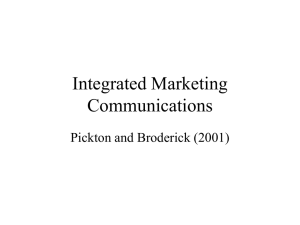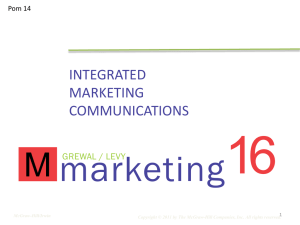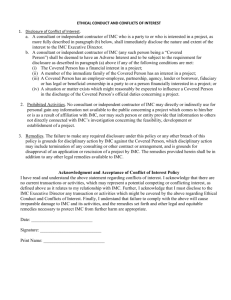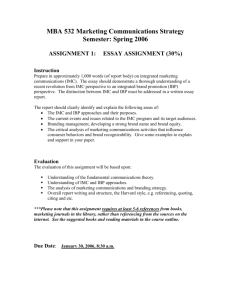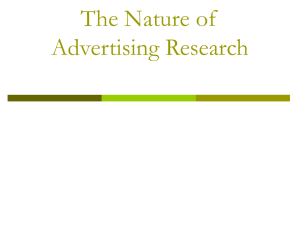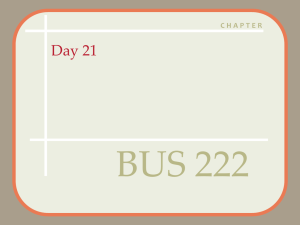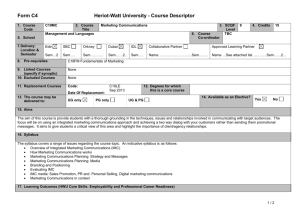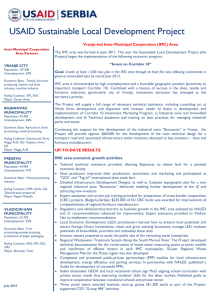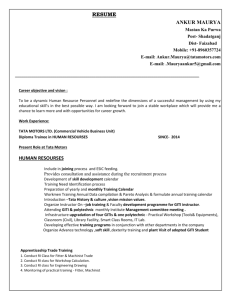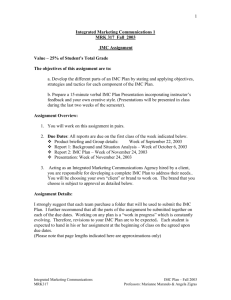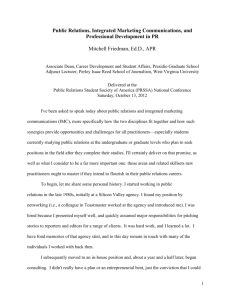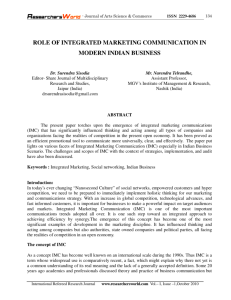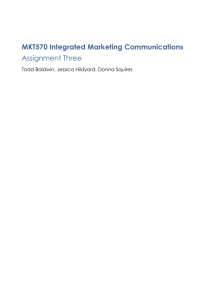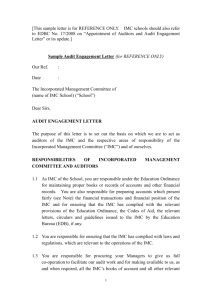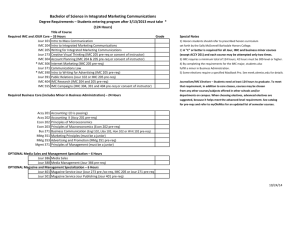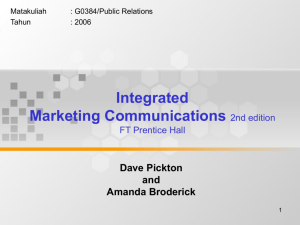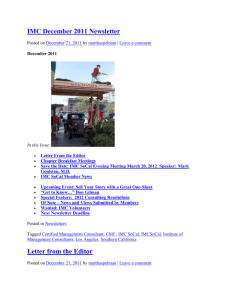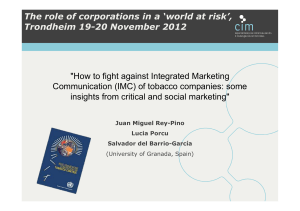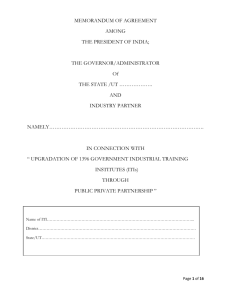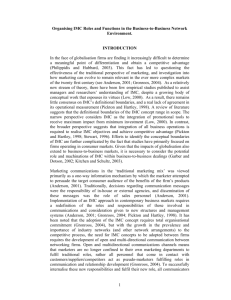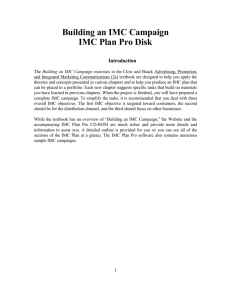Integrated Marketing Communication
advertisement
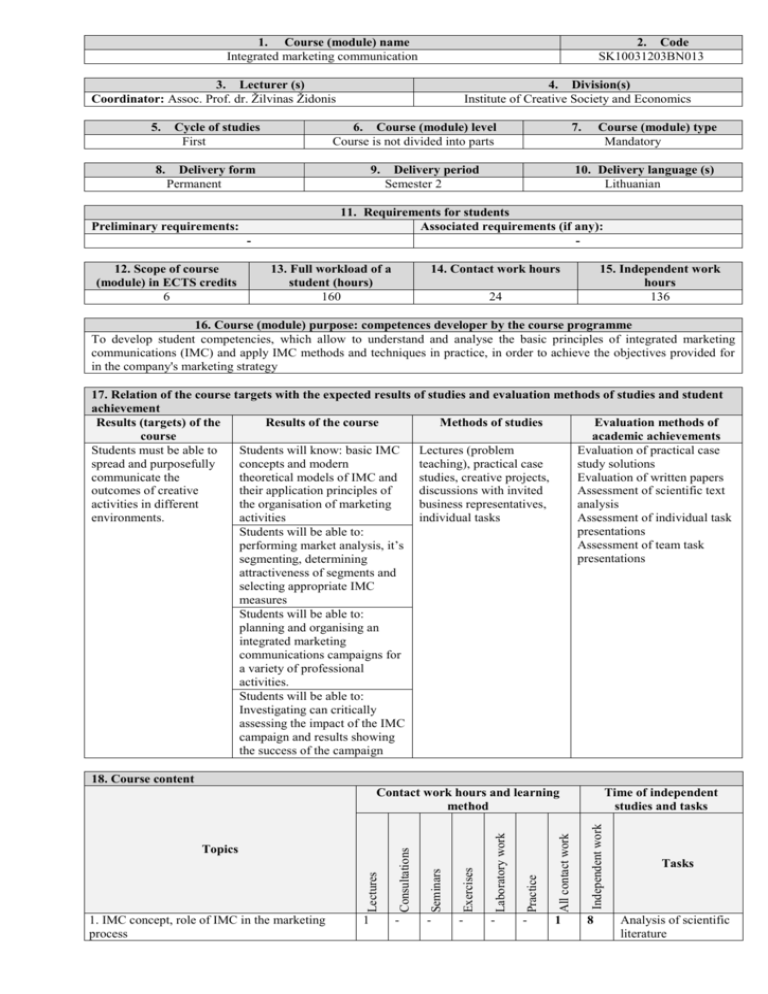
1. Course (module) name Integrated marketing communication 2. Code SK10031203BN013 3. Lecturer (s) Coordinator: Assoc. Prof. dr. Žilvinas Židonis 5. 8. Cycle of studies First 4. Division(s) Institute of Creative Society and Economics 6. Course (module) level Course is not divided into parts Delivery form Permanent 9. Delivery period Semester 2 Course (module) type Mandatory 10. Delivery language (s) Lithuanian 11. Requirements for students Associated requirements (if any): - Preliminary requirements: 12. Scope of course (module) in ECTS credits 6 7. 13. Full workload of a student (hours) 160 14. Contact work hours 15. Independent work hours 136 24 16. Course (module) purpose: competences developer by the course programme To develop student competencies, which allow to understand and analyse the basic principles of integrated marketing communications (IMC) and apply IMC methods and techniques in practice, in order to achieve the objectives provided for in the company's marketing strategy 17. Relation of the course targets with the expected results of studies and evaluation methods of studies and student achievement Results (targets) of the Results of the course Methods of studies Evaluation methods of course academic achievements Students must be able to Students will know: basic IMC Lectures (problem Evaluation of practical case spread and purposefully concepts and modern teaching), practical case study solutions communicate the theoretical models of IMC and studies, creative projects, Evaluation of written papers outcomes of creative their application principles of discussions with invited Assessment of scientific text activities in different the organisation of marketing business representatives, analysis environments. activities individual tasks Assessment of individual task presentations Students will be able to: Assessment of team task performing market analysis, it’s presentations segmenting, determining attractiveness of segments and selecting appropriate IMC measures Students will be able to: planning and organising an integrated marketing communications campaigns for a variety of professional activities. Students will be able to: Investigating can critically assessing the impact of the IMC campaign and results showing the success of the campaign 18. Course content 1. IMC concept, role of IMC in the marketing process 1 - - - - - 1 Independent work Time of independent studies and tasks All contact work Practice Exercises Seminars Lectures Consultations Topics Laboratory work Contact work hours and learning method 8 Tasks Analysis of scientific literature 2. Value proposition and its communication 1 - 1 - - - 2 9 3. Communications process 1 - - - - - 1 8 4. Marketing communication mix and its environment 1 - - - - - 1 8 5. Segmentation, target audience, positioning 1 - - - - - 1 8 6. Consumer behaviour 1 - 1 - - - 2 9 7. Advertising development and planning 1 - 1 - - - 2 9 8. Brand and brand communication 1 - 1 - - - 2 9 9. Public relations in the context of IMC 1 - 1 - - - 2 9 10. Sales promotion 1 - - - - - 1 8 11. Event development and planning 1 - - - - - 1 8 12. IMC and social networks 1 - 1 - - - 2 9 13. Private sales 1 - - - - - 1 8 14. Media selection and planning 1 - 1 - - - 2 9 15. Direct marketing 1 - - - - - 1 8 16. Planning of marketing communication campaigns 1 - 1 - - - 2 9 16 - 8 - - - 24 136 Total 19. Strategy and criteria of student assessment Assessment method Per cent Delivery time Assessment of case study 25% During the solutions semester Assessment of individual task presentations Examination – IMC plan and its presentation 20% 55% During the semester During the session Analysis of scientific literature Case study Analysis of scientific literature Teamwork Analysis of scientific literature Practical task Analysis of scientific literature Case study Analysis of scientific literature Group homework and its delivery Analysis of scientific literature Teamwork miniproject Analysis of scientific literature Case analysis, discussion Analysis of scientific literature Teamwork miniproject and its presentation Analysis of scientific literature Case study Analysis of scientific literature Practical task Analysis of scientific literature Group discussion Analysis of scientific literature Practical task Analysis of scientific literature Teamwork miniproject and its presentation Analysis of scientific literature Practical task Analysis of scientific literature Teamwork miniproject and its presentation Evaluation criteria Timely work, quality solution, proposed new ideas, insights and compliance with the assessment methodology Timely work, originality of the work, teaching logic, problem-thinking Compliance to the work structure, depth of analysis, suitability and originality of the results, creativity of solutions, logic of reasoning, independence 20. Sources of study, literature Mandatory sources of study, literature De Pelsmacker P., Geuens M., Van Den Bergh J. Marketing Communications: A European Perspective. Financial Times Management, 2010 Additional sources of study, literature Belch G. E., Belch M. A. Advertising and Promotion: An Integrated Marketing Communications Perspective, 9th Edition McGraw-Hill/Irwin , 2011 Lambin J. Market-driven Management: Strategic and Operational Marketing, 2 nd ed., Palgrave McMillan, 2007 Egan J. Marketing Communications, Thomson Learning, 2007
